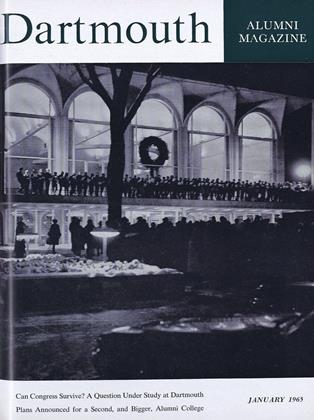Cosmopolitan Club Is An Active Center For Foreign Students
JANUARY 1965 A. DAVID MANGELSDORFF '67THE first Cosmopolitan Club at Dartmouth College started in March 1911, when a temporary organization was created as a result of the work of Kiyo Inui, a Japanese orator who was visiting the campus. The organization drew up a provisional constitution in May, and five years later, in January 1916, it joined the National Association of Cosmopolitan Clubs. Subsequently, though the records don't show exactly when, the club went out of existence.
After World War II, under the Displaced Persons Act of 1948, many foreign students came to American universities to study, and Dartmouth was one of the institutions granting scholarships to some of them. The Foreign Students Club was established on campus in 1950 with the purpose of helping to further international understanding. It endeavored to promote the discussion of ideas and beliefs, as well as provide information relating to the cultural, political, and economic backgrounds of the various countries from which the members came. The Foreign. Students Club was renamed the Cosmopolitan Club in May 1951. A primary function of the club is to promote friendship, goodwill, and better understanding of foreign undergraduates by Americans. This non-partisan organization serves as a means of integrating foreign students into an American college system.
The Dartmouth Cosmopolitan Club carries out its objectives in several ways. Frequent panel discussions on current international problems produce interesting and unusual opinions. Guest speakers give talks on topics ranging from art, religion, or philosophy to scientific advancements. And social activities are not neglected. The club holds several mixers with women's colleges in the area and also sponsors college conferences.
In 1950 the club collaborated with the National Students Organization and sent several Dartmouth foreign students on a trip around New England. An International Weekend sponsored by the club in April 1957 brought to Hanover thirty delegates from New England colleges. The Cosmopolitan Club Conference in May 1958 enabled undergraduates from several Eastern women's colleges to get together with Dartmouth students for a weekend of discussion groups, mixers, and receptions. Just this fall, the club became affiliated with the People-to-People organization. Such activities increase the understanding of young men of different backgrounds and help to make the foreign student feel at home in Hanover.
Students, members of the faculty, and Hanover townspeople have cooperated in a number of ways. Two faculty advisers, Prof. Herbert Sensenig '28 and Colonel Harold Moorman, counsel the incoming students. Beginning in 1963, the club has sponsored a program which assigns interested American undergraduates to foreign students to guide them through the first few hectic weeks. The family of James Campion '28 entertained a Swedish student at their home, and Prof, and Mrs. Clyde Dankert held a picnic for the foreign students.
Several former members of the club have already distinguished themselves. Fortunato E. Quesada '51 is presently the second secretary of the Peruvian embassy in Argentina. A Siamese student, Prasong Sukhum '53, holds the position of assistant budget director of Thailand. Other notable alumni and members of the Cosmopolitan Club have been: David Wang '55, who in addition to his creative writing, teaches at the University of Hawaii; Bernt Stigum '56 is Assistant Professor of Economics at Cornell; Chiharu Igaya '57 won a silver medal for Japan in skiing at the 1956 Olympics; and Seiko Enbutsu '58 is now a coordinating engineer with Mitsui Miike Machinery Company in Japan. These graduates stand out as examples of the fulfillment of the purpose of the Cosmopolitan Club, namely the promotion of goodwill and understanding among the peoples of the world.
A day in the open, at the Vermont farm of Prof. Clyde E. Dankert, is enjoyed by(l to r) David Currier '66, Shirazali Kotadia '68 of Kenya, David Mangelsdorff '67,John Wang '68 of Taiwan, and Juan Valencia '68 of Mexico.
 View Full Issue
View Full Issue
More From This Issue
-
 Feature
FeatureCAN CONGRESS SURVIVE?
January 1965 By ROGER H. DAVIDSON -
 Feature
FeatureALUMNI COLLEGE 1965
January 1965 -
 Feature
FeatureDartmouth on Capitol Hill
January 1965 -
 Article
ArticleA Darwin Letter at Dartmouth
January 1965 By ROBERT M. STECHER '19 -
 Article
ArticleWITH THE BIG GREEN TEAMS
January 1965 By ERNIE ROBERTS -
 Class Notes
Class Notes1920
January 1965 By GEORGE H. MACOMBER, ALBERT W. FREY









